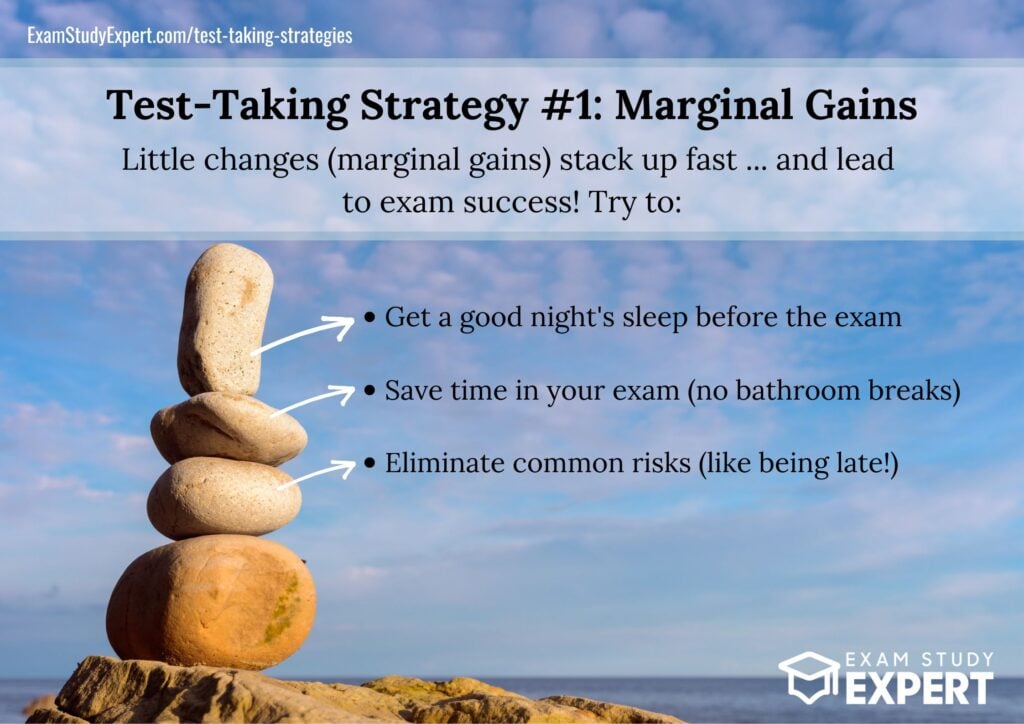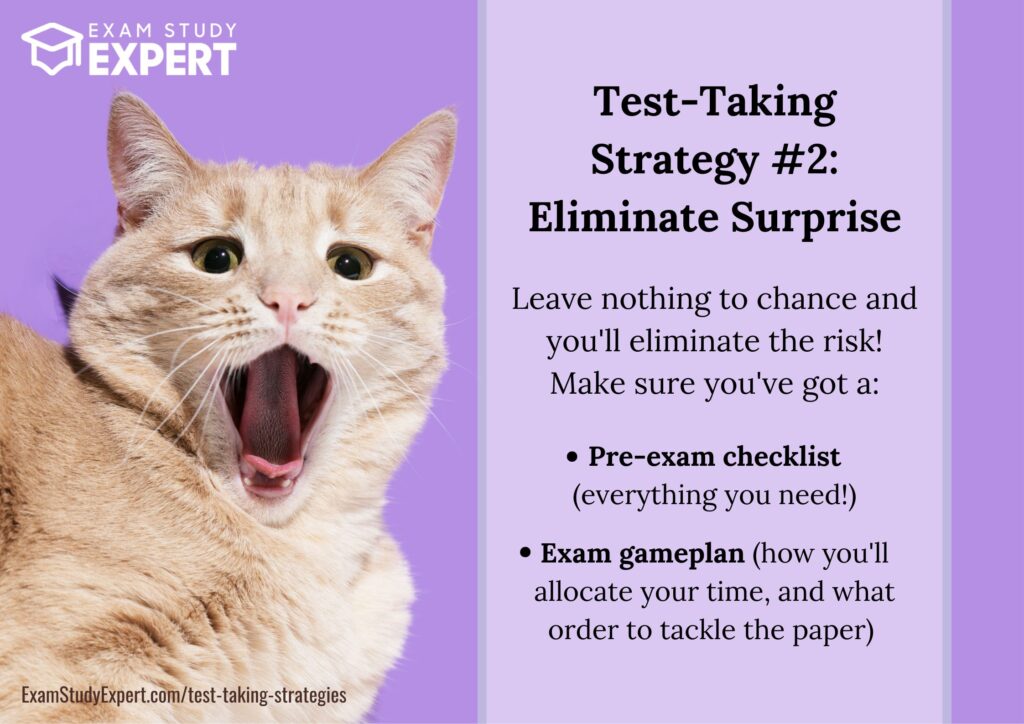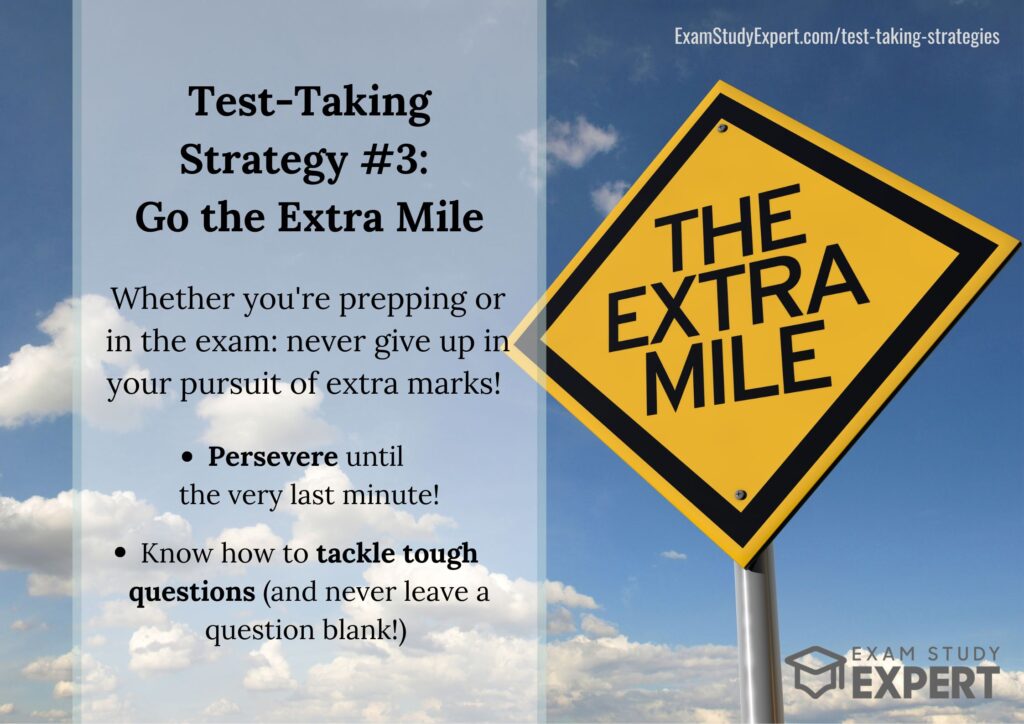You spend hours studying. But how much thought do you actually give to the strategies you’ll use as you take your test or exam? Give a little thought to the techniques you’ll follow in the test itself, and you can have a massive impact on your exam results, no matter how well-prepared you are.
Prefer to listen? This article is also available as a podcast:
By William Wadsworth, the Cambridge University trained cognitive psychologist and specialist in how to study smarter, not harder. He leads the world’s largest research study on use of effective learning strategies, is regular exam prep expert for The Times, and hosts the Exam Study Expert podcast, with 1 million downloads to date.
Additional research, graphics and article review by Dr Kerri-Anne Edinburgh
Why I have the answers you need:
I was a top 0.01% student in UK exam results when I was a teenager. Since I graduated from Cambridge University nearly ten years ago, I’ve helped thousands of students to great exam results through the blog, podcast, and the private coaching and tutoring I offer.
There’s one thing that’s frustrated me for all of that time, right back to when I was taking exams myself:
There are now so many brilliant tactics you can use to pick up more marks, drawing on what we can learn from fields as diverse as the science of elite performance under pressure, to the psychology of memory recall. Some of these are pretty powerful strategies for test taking, but they were scattered far and wide. I couldn’t find anyone who had brought them all together in one place.
Until now:
I’ve literally written the book on it: it’s called Outsmart Your Exams: 31 Test-Taking Strategies & Exam Technique Secrets for Top Grades. And if you love this article – I wholeheartedly recommend you try Outsmart Your Exams!

Let’s get started!
In this article, I’m going to summarise what I’ve learned about exam-taking strategies for students into three big over-arching principles.
I’m going to walk you through each principle in turn. Along the way, I’ll offer a whole set of actionable tips and tactics which you can put into practice immediately, helping you ace your next exam as soon the minute you’re done with this article.
Principle One: The Aggregation of Marginal Gains
Let me take you back to 1996, and the Athens Olympics.
Like most of the efforts of my home country, Great Britain, the performance of our track cycling team was pretty underwhelming, not resulting in a single medal.
But fast forward twelve years, and the team had been transformed into a true force to be reckoned with:
- The Beijing 2008 Olympics saw the team win 12 medals, 7 of them gold.
- London 2012: 9 track cycling medals, of which 7 were gold.
- Rio 2016: 11 track cycling medals, of which 6 were gold.
Top of the track cycling medals table each time.
The team has been widely reported in press interviews over the years as attributing this astonishing success to a principle they call the “aggregation of marginal gains”.
What are “marginal gains”?
Simply put, that means they didn’t only focus on the big, obvious advantages – like selecting the tallest, strongest riders, or making them train hard. But also on all the little advantages they could find, in every last aspect of what goes into making a medal-winning performance.
This included:
- Engineering every component of the bike, the outfit and the helmet for minimum weight and maximum aerodynamic properties.
- Discouraging riders from so much as walking to the shops and back in between training stints, so as to allow their legs to recover faster.
- Reducing the chance of riders getting sick by having surgeons train them to wash their hands to operating-theatre standards.
- Asking riders bring their own pillow and coffee machine from home to the hotel they stayed in competitions, so they could be guaranteed a great night’s sleep, and would be able to start the day feeling great, with a cup of coffee just how they like it.
Before the GB track cycling team, these issues were usually seen as too small, too insignificant to worry about.
So they were ignored.
On their own, no one gain was big enough to make a medal-winning difference to a cyclists’ performance. But add up dozens, even hundreds, of these “marginal gains”, and together, they meant an emphatic winning margin on race day.
Be like a champion cyclist, and pay attention to the marginal gains.
Using marginal gains in your exams
Three strategies you can use in exam week to give yourself a marginal advantage when you’re taking tests include:

1. Being well-rested before your exam
A good night’s sleep every day is key to being at your best in the exam hall.
The big step to take towards better sleep, even when you’re under stress, is to have a regular bedtime. Back this up with a regular “quitting time”, which is at least an hour, if not two, before bed.
That means you’ve got an hour or two once you’ve put your books away for the night to relax and wind down. Sleep scientists even recommend setting an alarm to remind you when it’s time to stop work for the day, and that that’s just as important as the alarm that wakes you up in the morning.
2. Saving time in the exam itself
How about in the exam itself? You should look for areas to save time.
- That might mean going easy on the tea, coffee and fizzy drinks before the exam, to reduce the chance you need to use the bathroom during the paper, especially if it’s a short exam. That could save you 5 minutes.
- Get your paper named while you’re waiting for the exam to start, if you can. This could easily save you another minute or two.
Setting out your answers matters too: good style really does count for something. If the examiner has to pick through messy handwriting or mathematical sums that aren’t clearly laid out down the page, he or she is simply going to be in a less generous mood. Not to mention you’ll find your own work harder to follow, making mistakes more likely and harder to spot.
3. Eliminate common risks
Finally, make sure you’re eliminating common risks that are unlikely but will have big consequences.
- Eliminate the risk of being late by having a back-up alarm set! If you can, have a reliable family member who knows your exam timetable standing by to make sure you’re up on time on exam day.
- Or in the exam, eliminate the risk you’ve misunderstood a question by reading it properly. That means forcing your eyes to slow down and take in every word, by reading with a pen, and underlining key words as you go.
Any one of these test taking strategies on its own might not make a world of a difference, but add up modest advantages like these, and you can see how, quite quickly, you’re able give yourself a pretty significant performance boost in the exam.
Principle Two: The Elimination of Surprise
Surprise is the enemy of success: forewarned, you can be forearmed.
There are two strategies that really matter when it comes to eliminating surprise when taking tests:

1. The power of the checklist
One powerful way to eliminate (or nearly eliminate) the chance of something important being forgotten is the checklist.
Simply put, checklists are used by people in high-pressure situations where the cost of a mistake can be substantial:
- Hospitals that use checklists have lower infection rates because they make far fewer mistakes in treatment.
- Pilots that use checklists fly safer planes because they are far less likely to make errors that can compromise safety.
- And the Japanese trains or New York subway that use checklists run with fewer delays.
I love using checklists to eliminate mistakes in the high-pressure situation that is exam week.
Try writing out a custom checklist for every exam you have to sit, with everything you need for that exam.
- That includes all the right stationery, spares like extra pens or back-up calculator batteries. Plus the things you need to get you to and into the exam hall, such as a travel pass or college ID card.
When you leave the house to go to your exam, physically check off your kit against your checklist to make sure you’ve remembered everything.
2. Your exam paper gameplan
The Principle of the Elimination of Surprise is also about making sure nothing catches you out about the exam format.
You know exactly what you’ll be asked to do, and you have a clear gameplan figured out and thoroughly tested for how you’ll allocate time to different tasks in the exam and the order in which you’ll work.
I’ve got a whole section on this in Outsmart Your Exams. There’s a surprising amount of thought you can put into your exam paper gameplan, if you’re doing it well.
Let me show you what I mean:
When I sat final exams at university, a typical exam paper was three hours, with three essays to write. My gameplan for the paper had me dedicating the first 45 minutes of the paper planning out each of my three essays, about 15 minutes per essay plan.
Get the hard thinking done early
I like to get the essays planned first. This allows you to make optimum use of your energy, emotions and recall in the exam:
- Energy because at the start of the exam you’re at your most fresh
- You can direct your brain at its most productive and creative towards the pivotal task of thrashing out the high-level structure of an essay, and marshalling the key points of your argument.
- Emotions because once you’ve planned all three essays, those plans become an invaluable safety net in case things go wrong.
- If you are running short of time, getting stressed, getting tired, it all doesn’t matter quite so much if you have a decent essay plan in front of you to work from. All you need to do is write up the plan.
- And recall because by getting your mental juices flowing on the the essay topics right at the start of the exam, you’ll find that – somewhere deep in the back of your mind …
- Your brain will spend the intervening time turning the topic over, rooting around for extra facts, clarifying structure, and even coming up with useful ways of phrasing things. In other words, while you’re working on other parts of the exam, you will be subconsciously preparing for the essays to come, making them that much easier to write up when the time comes.
Putting it to the test
But it’s not enough to simply know that you’re going to adopt a particular gameplan for answering your exam paper. You need to test it out by doing real mock papers under timed conditions.
Only then will you know that your chosen strategy for taking the test is going to be effective. And know that absolutely nothing about the timings or requirements of the exam will take you by surprise on the day.
Principle Three: Going the Extra Mile
This final principle of good test taking strategy can be summarised by this attitude: that while others can be good, you’ll be better.
I don’t want you to jump to the conclusion that going the extra mile is about burning the midnight oil through exam week, though. This certainly isn’t about working all hours and turning up exhausted, with bags under your eyes for each paper.
Not a good strategy if you want to be fresh as you’re taking the test.
Remember: as per the Principle of the Aggregation of Marginal Gains, exam week should feature plenty of sleep and an early stopping time each night, so you are as on top form for each paper you sit.
But there are plenty of places you can look for a rarely-walked extra mile, that won’t cause you to deplete your energy reserves too much. Try these two strategies:

1. Persevering to the end of that extra mile
In the run-up to each exam, it’s about preparing diligently, working “smart” not hard in your final preparations for each paper. You want to make your course content as accessible in your memory as possible on the big day.
In the exam itself, it’s about being greedier, thirstier, hungrier than most others, and pushing yourself (and your brain) in ways most don’t bother to do – particularly prior to reaching University level study, at any rate.
For instance:
- Many lose focus and all but stop working in the last 15 minutes of an exam! But instead the Principle of Going the Extra Mile tells us to keep going, and striving to earn marks right to the bitter end.
- Many settle for “good enough” once the paper is complete. But there are marks to be had in checking and double-checking your work for as long as there’s time on the clock.
- And many will start to relax towards the end of exam week. But instead, maintain your drive and discipline right to the final paper and see how far you can push your mark.
2. Attempting tough questions
“Going the extra mile” also applies to the way you approach individual questions.
I teach students a whole range of strategies to deal with tough questions on tests.
Here are some examples of the tactics you can use to salvage some marks from a tricky exam question:
For tough numerical problems in sciences and maths:
- Start by writing down all the information the question contains.
- Sometimes scientific scenarios are complex: try to look past the complexity, and write down all the relevant information the question provides you with. That might be a list of terms.
- Then, check the formula booklet, your crib-sheet or your memory for a formula which relates some or all of the terms you’ve just written down. Do any of those look helpful?
- Maybe you can do an intermediate calculation which gets you part of the way, even if you don’t know where to go from there – that might score you some marks by itself, and sometimes, may make the rest of the solution clear.
For tough language questions:
- Stop trying to answer it all in one go, and instead, break it down. Write down what you do know, if anything.
- Trying to translate a long sentence you only know half of? Write out the sentence, with the translations you do know underneath, or if you’re not sure, write down two or more options for the word.
- Can you use a combination of common-sense and “guesswork” to fill in the blanks?
In fact, for any tough question, make sure to ask yourself:
- Could you work backwards from an answer you know or believe to be true?
- Can you make a guess at an early stage in a question, to allow you to pick up “error carried forward” marks for later steps you can do?
Often, the tougher questions in papers are when the examiner asks you to apply what you do know to unfamiliar situations. Don’t let the unfamiliar scenario be a barrier. Go back to the principles or rules you know, and apply brainpower carefully and methodically, to see if you can come up with a plausible solution.
If all else fails, just getting some relevant information down – even just a definition or a formula – and you may pick up a mark or two.
Above all, the student who goes the extra mile never leaves a blank, there’s always something you can say.
One of the nice things about the Principle of Going The Extra Mile is that it applies universally, no matter where you’re at with your studies. So whether you’re aiming to scrape a “C” or soar through with an “A Double Star”, keep striving, and don’t settle for any less than the absolute maximum number of marks you can achieve.
How to ace your test: taking your test-taking strategies to the next level
If you’d like to go deeper on how to find more advantages for your upcoming exams, you can pick up a copy of my book Outsmart Your Exams. The book goes into far more detail, with 31 test-taking strategies for students taking exams in high school, college and university.
Outsmart Your Exams is packed with step-by-step instructions and ingenious strategies to improve every aspect of your exam-taking game. It also includes plenty of print-at-home templates and tables to save you time in the run-up to your test, and help you ace the exam.
Very best of luck with your studies, and if you have exams coming up soon, I’ll be rooting for you!

By William Wadsworth, the Cambridge University trained cognitive psychologist and specialist in how to study smarter, not harder. He leads the world’s largest research study on use of effective learning strategies, is regular exam prep expert for The Times, and hosts the Exam Study Expert podcast, which has 1 million downloads to date.
Author Profile | About Us | Editorial Policy | Contact Us


